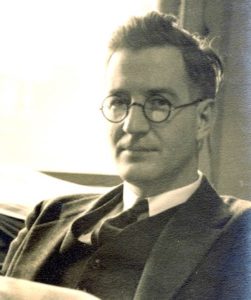
Clifford Durr
*The birth of Clifford Durr in 1899 is marked on this date. He was a white-American lawyer.
Durr was born into a prominent patrician Alabama family. He graduated from the University of Alabama and attended Oxford as a Rhodes scholar. He returned to the United States to study law and joined a prominent law firm in Birmingham, Alabama, in 1924. Two years later, he married Virginia Foster, whose sister would be the first wife of Senator Hugo Black. Durr played an important role in defending activists, African Americans, and others accused of disloyalty during the New Deal and McCarthy eras.
Durr lost his job in 1933 after protesting the firing of a secretary at the firm. His brother-in-law Black, then a Senator, asked him to come to Washington, D.C., where he took a job with the Reconstruction Finance Corporation. There, Durr became a dedicated new dealer. He resigned from that agency in 1941 after disagreements with his superiors over their approval of agreements with defense contractors. These contracts allowed them to concentrate their monopoly position and derive windfall profits from war preparation efforts. President Franklin D. Roosevelt then appointed Durr to the Federal Communications Commission to counter the increasing power and concentration of broadcasters, many of whom were opponents of the New Deal.
Durr campaigned to set aside educational program frequencies and open the airways for more diverse applicants. This spurred investigations of the FCC by the House Un-American Activities Committee (HUAC) and J. Edgar Hoover's FBI. The FBI put him under surveillance in 1942 because he had defended a colleague accused of left-wing political associations. His wife's vigorous support for racial equality and voting rights for Blacks and their friendship with Jessica Mitford, a member of the Communist Party, made both of them even more suspect. Durr resigned from the FCC in 1948 after dissenting from its adoption of a loyalty oath demanded by the Truman administration. When he joined the National Lawyers Guild, the FBI increased its interest in Durr in 1949. He subsequently became the President of the Guild. After leaving the FCC, Durr opened a law practice in Washington, D.C..
He was one of the few lawyers willing to represent federal employees who had lost their jobs due to the loyalty oath program; he took many of their cases pro bono. He did not apply any litmus test of his own, choosing to represent both those who had been members of or closely aligned with the Communist Party and those falsely accused of membership. He represented Frank Oppenheimer, brother of the "father of the atomic bomb," Robert Oppenheimer, and several other scientists investigated for disloyalty by HUAC. Durr and his wife moved to Colorado to work for the National Farmers Union when it became evident that he could not make a living defending those accused of disloyalty. However, his wife's political activities, as a member of the Southern Conference for Human Welfare and the National Committee for the Abolition of the Poll Tax, her past membership in the Progressive Party, and his political activities caused him to lose that position.
By 1954, his practice was in financial ruin, and he and his wife decided to return to Montgomery. Inevitably, controversy dogged them. On one occasion, Virginia Durr was subpoenaed to appear in New Orleans before a Senate Internal Affairs Committee subcommittee chaired by Senator James Eastland, a fellow Southerner who epitomized most of what the Durrs opposed. Through a fluke, Clifford Durr was permitted to cross-examine a former communist turned professional informant. He demolished the witness who had besmirched his family's honor, subjecting the man to such humiliation and ridicule that he never again testified at a congressional hearing. And then, to top it off, he punched the man, an act caught by a photographer and printed in newspapers around the country. Again, Senator Eastland subpoenaed Clifford Durr and his associate Aubrey Williams to a Senate Subcommittee on Internal Security hearing investigating the Highlander Folk School, with which both Durrs and Williams had been associated.
With the assistance of Senator Lyndon Johnson, Durr succeeded in discrediting the hearing, but only after nearly fighting with a witness in the hearing room. In the process, however, Durr's health and law practice suffered, as he lost most of his white clients while the FBI increased surveillance of him and those around him. Durr continued to practice in Montgomery as counsel, along with a local attorney, Fred Gray, for Black citizens whose rights had been violated. He and Gray were prepared to appeal the conviction of Claudette Colvin, a Black girl woman charged with violating Montgomery's bus segregation laws in the summer of 1955. Still, they elected not to do so when E.D. Nixon and other Black activists decided that hers was not the case to use to challenge the law.
Durr was ready in December 1955 when police arrested Rosa Parks for refusing to give her seat to a white man. Durr called the jail when authorities refused to tell Nixon what the charges against Parks were, and he and his wife accompanied Nixon to the jail when Nixon bailed her out. Nixon and Durr then went to the Parks' home to discuss whether she was prepared to fight her charges. Durr and Gray represented Parks in her criminal appeals in state court, while Gray took on the federal court litigation challenging the ordinance's constitutionality. He also represented Rosa Parks in her challenge to the constitutionality of the ordinance requiring the segregation of passengers on buses in Montgomery that launched the Montgomery Bus Boycott.
Durr continued representing activists in the civil rights movement, supported by financial support from friends and philanthropists outside the South. He eventually closed his firm in 1964. He lectured in the United States and abroad after his retirement. He died at his grandfather's farm in 1975.